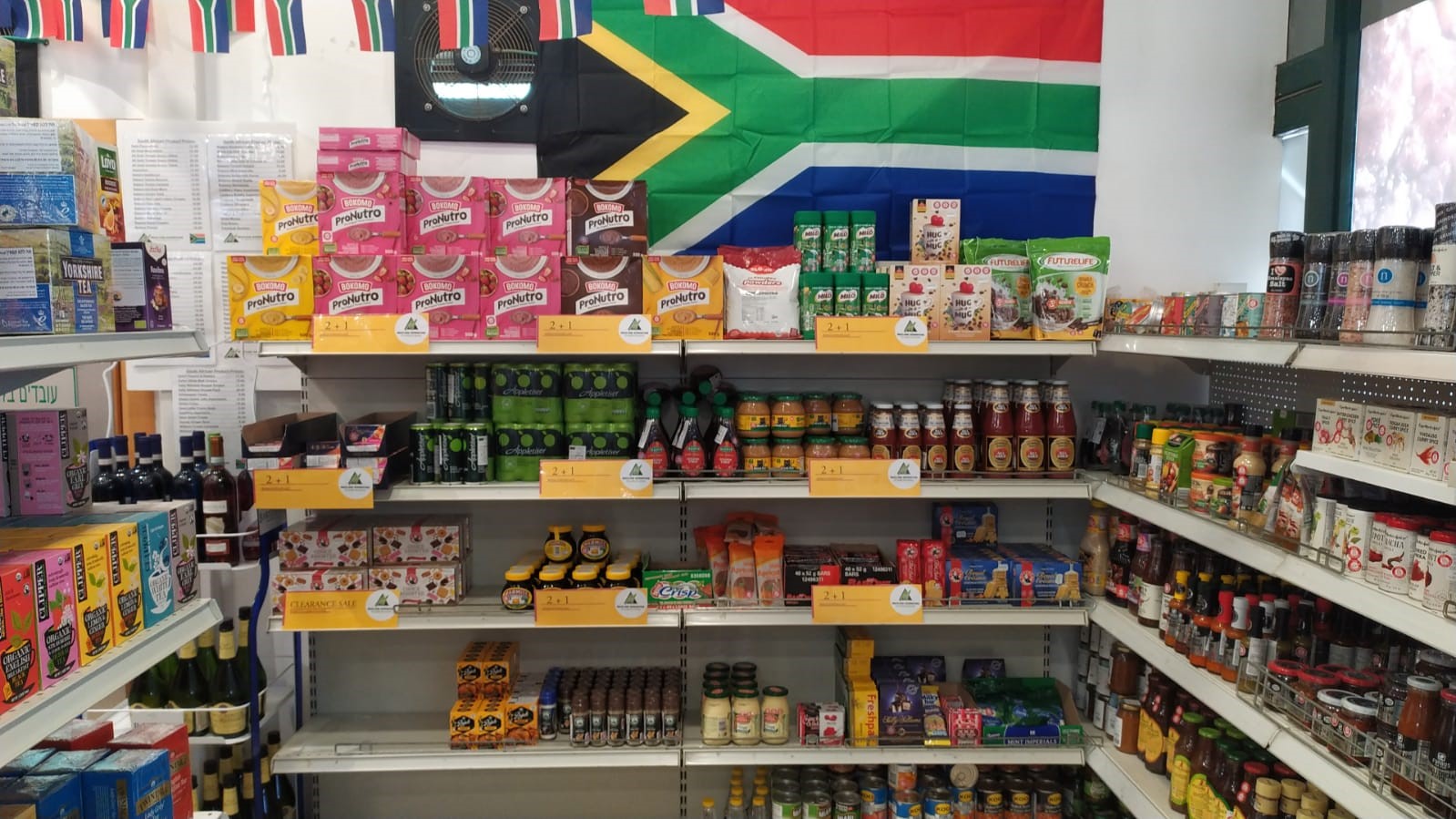
Banner

Boycotting SA products damaging and pointless, say olim
While there are renewed calls in South Africa to boycott so-called “Zionist-linked products”, former South Africans living in Israel say that a call to boycott South African goods would hurt the South African people, not the government.
The United Ulama Council of South Africa (UUCSA), whose members include the Muslim Judicial Council and other similar bodies, have made a “community appeal” written by UUCSA Secretary General Yusuf Patel, who wrote, “From an Islamic perspective, the boycotting of products and entities supporting the killing and murder of fellow Muslims is consistent with the spirit of global solidarity and a financial jihad against injustice.”
The notice calls on followers to boycott Cape Union Mart, Dis-Chem, Clover, and Teva Pharmaceuticals. Though the first two are Jewish-owned, they have no Israeli ties. The second two have Israeli links but have made no contribution to Israel’s war against Hamas. The International Holocaust Remembrance Alliance’s working definition of antisemitism states that “holding Jews collectively responsible for actions of the state of Israel” is antisemitic.
“UUCSA commends all those who have taken their own initiative of boycotting certain projects with Zionist links,” wrote Patel. “While the focus is on the cited companies, consumers are encouraged to continue or start – based on personal research and convictions – to make ethical choices in boycotting Zionist-linked products and services.”
Philip Krawitz, the executive chairperson of the Cape Union Mart Group, said, “I’ve read with concern the flyer by the United Ulama Council of South Africa, as well as the Palestinian Solidarity Campaign and Boycott, Divestment, Sanctions calling for boycotts against companies within the Cape Union Mart Group. I’m a great believer in the democratic right to protest within the boundaries of the law. I also believe that consumers have a right to decide from whom they will make their purchases and who they may wish to boycott. However, in calling on consumers to protest or boycott, it’s important that decisions should be based on well-researched facts. Consideration should also be given to the wider impact on the South African economy.
“I reiterate that neither Cape Union Mart nor any of the companies within our group have ever contributed to any causes outside South Africa,” he said. “Furthermore, we have never made donations to any armies – local or international. We abhor war, and believe that disputes should be settled through negotiations between willing partners aiming for constructive outcomes.
“In my personal capacity, I’ve supported worthy causes both in South Africa and in Israel,” said Krawitz. “I do that in terms of my constitutional rights. Many of the causes and projects I have supported in Israel have focused on building better multicultural relationships.
“In a country with an unemployment rate of 31.9% and youth unemployment in the 15 to 20 age group of 60.7%, I sincerely believe that companies in South Africa have a duty to create as many jobs as possible. This has always been our mantra, and we’re proud of the fact that about 3 600 people are employed throughout our group. This number includes several hundred Muslim team members, many of whom have been with us for decades and occupy senior positions. The boycotts and protests are aimed at damaging our companies and in so doing, damage will be caused to the greater economy, potentially resulting in job losses.
“As already stated, our company and I have absolutely no links whatsoever to the Israeli army. This leaves me with the inescapable conclusion that we are being targeted simply for being Jewish. If that’s the case, it would be a sad day for a country which holds itself up as an icon of tolerance.”
Antisemitism expert and emeritus professor of history at the University of Cape Town, Milton Shain, said, “The fact that, to my knowledge, boycotts were never called by this organisation against China’s persecution of the Uighurs, the carnage in Yemen, or [Bashar al] Assad’s massacre of his Syrian countrymen must leave one wondering if a special hatred and measure is reserved for the Jewish state only.”
Wendy Kahn, the national director of the South African Jewish Board of Deputies, said, “Religious bodies have the potential to be unifiers and to bring communities together in dialogue. It’s regrettable that the UUCSA has chosen rather a path of division and antagonism. To import the tragic conflict in Israel and Gaza to threaten the businesses of fellow South Africans citizens is deeply unfortunate.
“Calling for boycotts of Jewish businesses does nothing to address the suffering in the region, and only causes hate between our own citizens. Holding South African Jews accountable for a conflict on another continent is ludicrous.
“For decades, these businesses have created jobs in our country and contributed to building our economy. Destructive calls like this show the Ulama Council putting its hate-filled and pointless political agenda above the interests of the people of our country.”
Rowan Polovin, the national chairperson of the South African Zionist Federation, said, “Jewish entrepreneurship and business has made an outsized contribution to the South African economy and created millions of jobs. The targeting of Jewish-owned businesses in South Africa, or those with connections to Israel, is simply a means to harm the South African economy and South African workers.
“These antisemitic boycott efforts are self-destructive, and have absolutely no impact on Israel, whose economy is far stronger and more resilient than South Africa’s. They also serve to create divisions inside local companies, pitting employees of different religions and political beliefs against each other. They ultimately lead to more economic hardship in our country. Once again, the anti-Zionists show they have little interest in resolving the Palestinian-Israeli conflict, but simply in fostering hate.”
Meanwhile, a few South Africans in Israel have called for the boycott of South African products over South Africa taking Israel to the International Court of Justice. It was reported on 22 January that two major supermarkets in Israel, Shufersal and Rami Levi, had stopped ordering grapes from South Africa out of concern about a consumer boycott.
However, many South African olim told the SA Jewish Report that they felt boycotting South African products was problematic. “I actually just bought grapes in Israel from South Africa,” said Leah Goldberg. “I don’t believe in boycotting South African products. Hate doesn’t heal hate, so why do what anti-Israelis do?”
Martine Alperstein pointed out that such a boycott could also hurt South Africans who import South African goods to Israel. “These people have spent hundreds if not thousands of shekels getting the products approved. They’ve paid taxes, they’ve spent years working on the best routes, systems, postal services, etcetera, building up their clientele. Boycotting South African products as an ex-South African living in Israel is pointless, shallow, and a waste of time.”
“If you boycott South Africa, you’re going to hurt businesses,” said Lawrence Berzen. “South Africa, with or without our support, couldn’t give a damn. It has shown this by supporting Hamas. We should carry on supporting those who stand with Israel.
“It’s silly to boycott South African goods,” said Juan-Paul Paysach Burke. “It’s hurting the people of South Africa, not the government. The government is the problem. I don’t think we should encourage a spiral of boycotts. There must be a better response.”











Robert Mancusso
January 27, 2024 at 6:01 pm
Antisemitism expert and emeritus professor of history at the University of Cape Town, Milton Shain, said, “The fact that, to my knowledge, boycotts were never called by this organisation against China’s persecution of the Uighurs, the carnage in Yemen, or [Bashar al] Assad’s massacre of his Syrian countrymen must leave one wondering if a special hatred and measure is reserved for the Jewish state only.”
If one takes into account how Islam negatively portrays Jews to put it mildly, it becomes painfully obvious that Israel as he world’s only Jewish state, is targeted by Muslims precisely because it is a Jewish state. Make no mistake, this is a religious war and anyone who thinks otherwise is being naive.
Revolution p
February 6, 2024 at 4:52 pm
I have been watching very close and hard close at these events that have unfolded. As I have spoken to some people, looking at how darkness has rocked the whole globe when it comes to the people and the nation of Israel. Ask the Jewish people they will tell you this is a religious war and likewise the Muslim world. Plainly stated in the Hamas charter that this is a religious war which means the reasons of the conflict are hiding behind the political landscape which in reality is nourished by lies.
Lies that Israel came into existence only in 1948, let alone Israel is far much older than SA and many nations on the planet.
The Israel we have known for ages is the same Israel we see and unfairly treat today. One of tiny countries on the planet earth yet had a very significant history than any other nation on earth. Jerusalem we see today is the same Jerusalem of 2000 years ago when Johannesburg and Capetown wasn’t there. It is sad today seeing that Every thing has been politicised and deny the concrete truth we cannot erase.
When we help Hamas to and its goals it means Hamas will achieve what it has aimed to in fulfilling its religious base which many countries SA inclusive sadly dont know or ignore. Not one individual in the history of the world has given the names of Israel and Jerusalem respectively so thus no one cannot erase them from the river to the sea rhetoric. Kiljarth-aba is Hebron and is what they call now west bank, sadly under the narrative of occupation.
History repeats itself, and Israel we hate today shall stand forever out of boycotts , unfair judicial systems, in isolation or whatever it may be. Israel is in the same old place, same name, same people and same language.
Johannes
February 2, 2024 at 12:48 am
I would say ban all Israel products.
Iscar is one of the largest companies in Israel and belongs to Warren Buffet. They import daily cutting tools into South Africa.
ISCAR (IsraelCarbide).